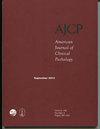临床决策支持提高了自身免疫/副肿瘤抗体面板的利用率
IF 1.9
4区 医学
Q2 PATHOLOGY
引用次数: 0
摘要
目标 选择自身免疫/副肿瘤抗体检测板仍然是一项挑战,因为医疗保健专业人员往往不熟悉检测板的内容、推荐的标本类型以及特定患者的抗体组合。使用不当会增加成本,引起不必要的额外检查,并延误患者症状真正原因的鉴定。在本研究中,我们评估了订单输入临床决策支持是否能提高自身免疫/副肿瘤抗体检测板的利用率。方法 在电子病历系统中嵌入订单输入临床决策支持工具。该决策支持工具采用嵌套式面板结构,提示临床医生确定患者的临床表现,并指导选择适当的检测项目。此外,该工具还具有重复检查功能,当临床医生在 3 个月内多次下达抗体内容基本相似的订单时,该工具会发出警报。在实施前的 12 个月中,对专家小组的订购实践进行了评估,并与实施后的 6 个月进行了比较。结果 临床决策支持大大降低了所有订单的月检验量,从实施前的每月 75.8 份降至实施后的每月 54.5 份(事故率比 [IRR],0.72;95% CI,0.63-0.81;P < .001)。对抗体内容基本重叠的检测板进行多次订购的情况也明显减少,从每月 7.0 次降至每月 1.2 次(IRR,0.17;95% CI,0.07-0.33;P &p;lt; .001)。检测到的神经特异性抗体数量保持不变,但检测总量的减少使神经特异性抗体阳性率从 4.2% 上升到 6.8%(IRR,1.61;95% CI,0.94-2.70;P = .075)。结论 订单输入临床决策支持为提高自身免疫/副肿瘤抗体检测的利用率提供了一种高效、有效的方法。本文章由计算机程序翻译,如有差异,请以英文原文为准。
Clinical decision support improves autoimmune/paraneoplastic antibody panel utilization
Objectives Selection of autoimmune/paraneoplastic antibody panels remains challenging because health-care professionals often lack familiarity with panel contents, recommended specimen types, and antibody combinations for a given patient. Inappropriate use adds cost, prompts unnecessary additional workup, and delays the identification of the true cause of patient symptoms. In this study, we assessed whether order-entry clinical decision support can improve autoimmune/paraneoplastic antibody panel utilization. Methods An order-entry clinical decision support tool was embedded in the electronic health record system. Using a nested panel structure, the decision support tool prompted clinicians to identify their patient’s clinical presentation and guided selection of the appropriate tests. In addition, the tool featured a duplicate checking function to alert clinicians when placing multiple orders with substantially similar antibody content within a 3-month period. Panel ordering practices were assessed during the 12 months before implementation and compared with the 6 months immediately following implementation. Results Clinical decision support significantly reduced the monthly test volume of all orderables from 75.8 per month before implementation to 54.5 per month after implementation (incident rate ratio [IRR], 0.72; 95% CI, 0.63-0.81; P < .001). Placement of multiple orders for panels with substantially overlapping antibody content also decreased significantly, from 7.0 per month to 1.2 per month (IRR, 0.17; 95% CI, 0.07-0.33; P < .001). The number of neural-specific antibodies detected remained unchanged, but the reduction in total test volume increased the neural-specific antibody positivity rate from 4.2% to 6.8% (IRR, 1.61; 95% CI, 0.94-2.70; P = .075). Conclusions Order-entry clinical decision support offers an efficient and effective approach to improve the utilization of autoimmune/paraneoplastic antibody panels.
求助全文
通过发布文献求助,成功后即可免费获取论文全文。
去求助
来源期刊
CiteScore
7.70
自引率
2.90%
发文量
367
审稿时长
3-6 weeks
期刊介绍:
The American Journal of Clinical Pathology (AJCP) is the official journal of the American Society for Clinical Pathology and the Academy of Clinical Laboratory Physicians and Scientists. It is a leading international journal for publication of articles concerning novel anatomic pathology and laboratory medicine observations on human disease. AJCP emphasizes articles that focus on the application of evolving technologies for the diagnosis and characterization of diseases and conditions, as well as those that have a direct link toward improving patient care.

 求助内容:
求助内容: 应助结果提醒方式:
应助结果提醒方式:


